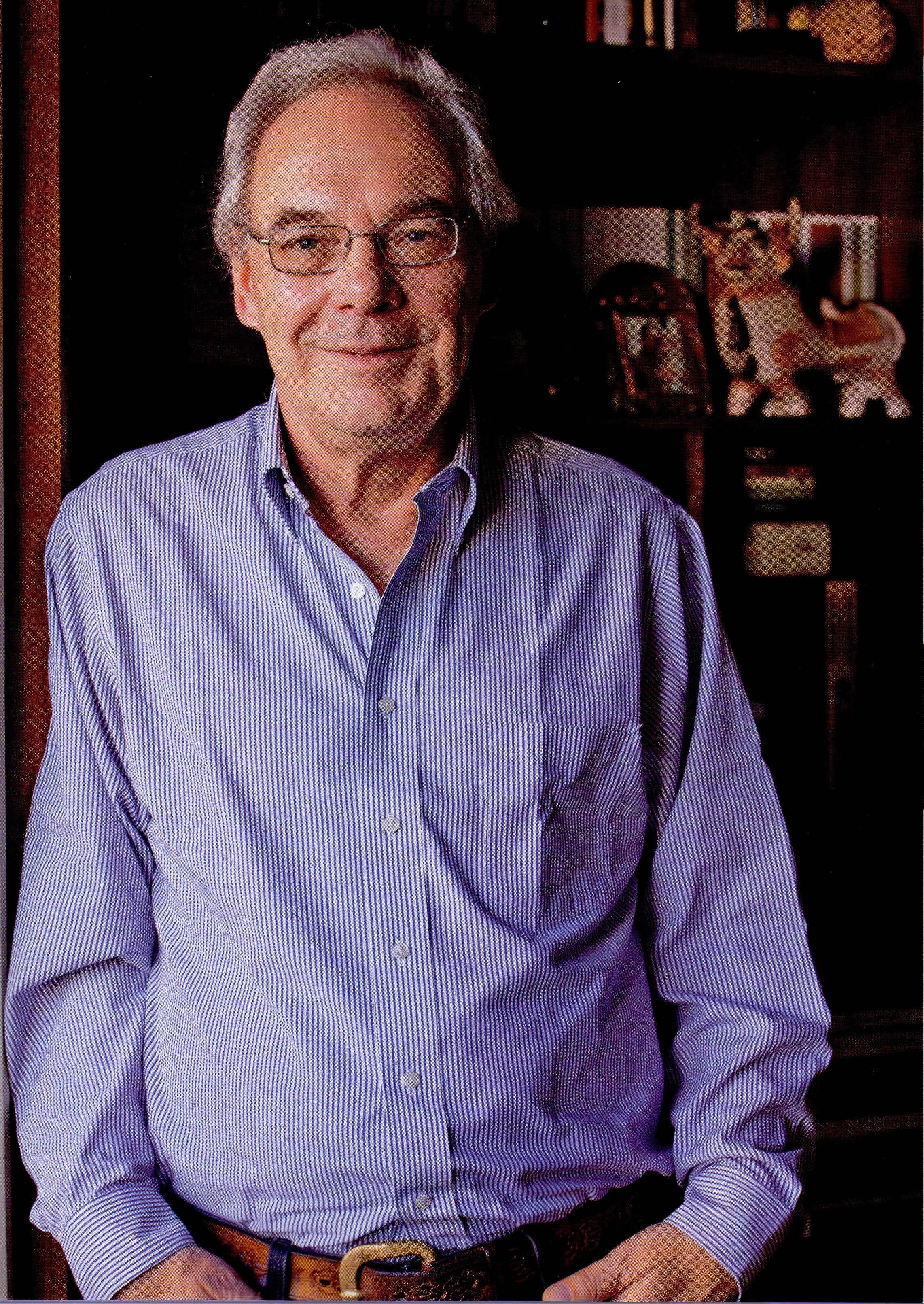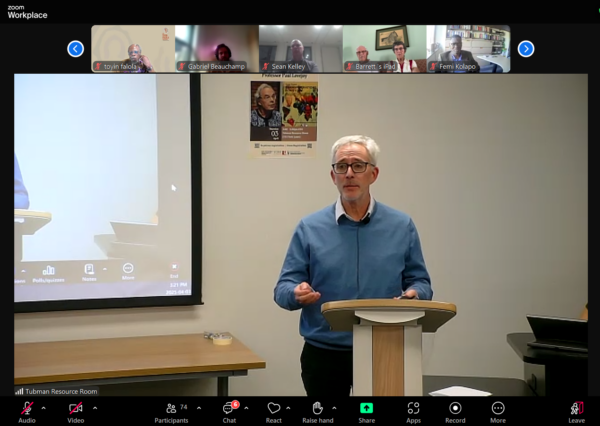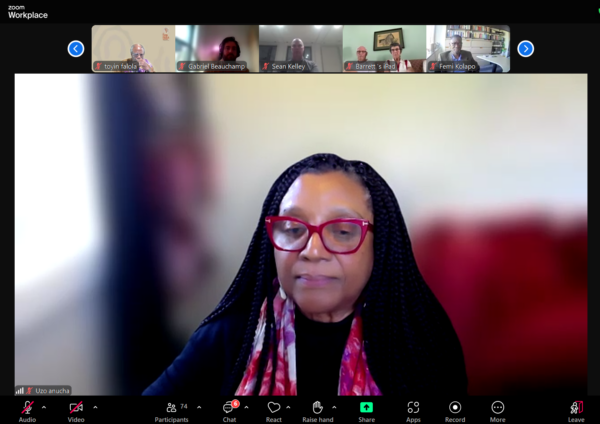Toyin Falola
With gratitude to Professor Damilola Adebayo and his outstanding colleague, Fabio Silva Magalhaes, we honored the enormous contributions of Paul Lovejoy on Thursday, April 03rd, 2025, and discussed my book on his work. A recording of the event can be found at https://www.youtube.com/watch?v=WIPBxKpIGNU. This reflection is based on the various eulogies during this outstanding ceremony.

From the time humans understood that their existence in life is measured not exclusively by the number of years that they spend on the surface of the earth but also by the magnitude of impact they leave behind, many of them have always desired to write an unforgettable history of themselves through what they do while living. But to desire is to intend, which is not enough to convince the world about the indestructibility of our contributions. Contributions are not seen when they don’t have a measurable impact. As a result, anyone who wants to be remembered needs to do more than intended: they need to graduate from having mere intentions to transferring them into observable actions. This is underscored by the awareness that people who have come across our actions would not only accept the genuineness of changing the world for the better, but they would also appreciate what we have done to better it.

On this note, Paul Lovejoy comes across as an individual with an immense desire to change the world, but he did not limit his life to merely intending to do this. Instead, he pursued this desire with the intensity of an unmistakable action of his uncompromising determination to get things done. Before the emergence of Paul Lovejoy in the historiography of slavery in Africa, especially concerning how it undergirded the underhanded politics of race, difference, and exclusion, several historians who have written about the events considered the experience from various contradictory angles. Lovejoy undertook research that changed our understanding of African history.

I should state from the beginning that writing history is a complex project, as writers are usually sure to have an admixture of sweet and bitter experiences while doing it. As interesting as that engagement is, I have never seen something more delicate and complex. This is so considering the understanding that historians sometimes consider themselves as the alpha and omega of whatever they are writing about in the sense that what they have successfully written may as well determine the ideas on the subject for a long time. In essence, many historians, especially those motivated by an uncanny desire to mutilate and gruesomely desecrate the activities of their subjects, always give accounts of their subjects in ways that showcase their inchoate dislike towards the people on whom they write. It is by no coincidence that many historical works on slavery, for example, today, authored by the same forces that came to enslave them, painted Africans in a bad light, thereby creating a very wrong impression about them to those who have already internalized a bias against the subjects. To these categories of audience, having a scientific basis for Africans was required, and the works published by purveyors of wrong information became their longstanding evidence. It bears no restating that published history works are often considered scientific because of the general awareness that publication usually takes a very long process, implying that it is rigorously conducted. The fact that Lovejoy, among the tiniest groups of globally acclaimed researchers, came forward with dedicated interest to writing the history of slavery puts him on a pedestal that is impossible to dishonor.

I say this because his body of work, which everyone would bear a testament to, reveals his deep-seated respect for the people he writes about. We can argue that such a level of respect forms the basis of his intellectual undertaking, which prevents confirmation bias and ensures that he conducts objective work reflecting the actual situation. Demonstrating such respect in person and writing becomes the basis for the reliance on his trade. It enhances mutual trust that informs the unimpeded openness that they showed him while his research was ongoing. I noticed immediately that by securing trust and mutual support from the people he writes about, he paved the way for himself to enjoy an enduring career that generally shines a light on academics. I come to this conclusion knowing that despite his uncompromising dedication to the documentation of the history of African people, especially about the events of slavery and colonialism, Lovejoy does not fail in other areas of responsibilities associated with him. In essence, he reserves the capacity to achieve tremendously both in the research field and the administration where he finds himself. It is no news that Professor Lovejoy personally brought together eggheads and ensured that they produced instructive academic works which would bridge the gap of ignorance on slavery and other events of the world. By doing so, he makes himself better and transforms the people around him. The fact that Lovejoy surrounds himself with the caliber of people who make things happen cannot be disconnected from his insatiable quest for the best in everything he does.

Although people sometimes ask how academics do it, and sometimes, when I take some step backward to review things for myself, I am always dumbfounded as to how academics can multitask as they have, regardless of the immense responsibility that they have on them. I am surprised, however, by the enormous contributions that Lovejoy has made to budding intellectuals. To be able to attend to different things simultaneously is an unusual gift, and for what it is worth, I am in awe of what this distinguished man has done for himself and the academic family generally. Regardless of where you are, I mean professionally in terms of your disciplines, Lovejoy has always shown his desire to contribute that would typically transform the events of your life.

During the tribute organized to celebrate this extraordinary intellectual, many scholars mentioned that he had contributed excellently to their academic lives. Then, some revealed how Professor Lovejoy creates time for anyone seeking professional advice and recommendations despite his busy schedule and workload. He, therefore, functions both as a proficient academic and a mentor who undertakes the two responsibilities with great success. One cannot imagine how such availability has inspired many people to become the best in what they do. Many people mentioned how his timely intervention in terms of advice, guidance, and direction had become the background of their greatness.
We cannot but continue to celebrate the grace that Lovejoy has brought to African scholarship at York University, Canada, because we understand the personal sacrifice that people like him made to plant the root of such scholarship deeply. As one of the pioneers of the Department of History, functioning as the chair, it is worth mentioning that he saw erecting a foundation for African history in the department so that the generations to come would have something to build on. He did this by making himself available, tending to things that would make it possible to accomplish such a lofty desire. We, therefore, cannot underestimate what his presence has facilitated in the faculty, where he made people better by merely being himself. For example, you will feel lonely and detached when you arrive at a new destination. You only feel accepted when you notice some things that restore your confidence. For Africans who have come to York University as faculty members or graduate students, the affection of Lovejoy is the companion that would make your stay easy and enjoyable. This becomes the case when you encounter several works by an author highlighting your history’s significance through his dedicated research. You begin to muster the courage to be yourself, carrying on your shoulders some measure of pride because you come across writings that project your history and reveal the importance of your forebears.

It is on the basis that Lovejoy has become so important in the lives of many that we have come to celebrate him, and more importantly, that I have written a book about him and the numerous achievements he made as a researcher. Watching the video of the event and reading the book on him will transport you to the world of Lovejoy’s intellectualism and reveal to you the indescribable contributions he has made to the extension of scholarship that advances the agitation of the subaltern. We celebrate him and appreciate what he has done to advance scholarship; his efforts will always inspire generations of scholars who are here now and who will come at the later stages.
